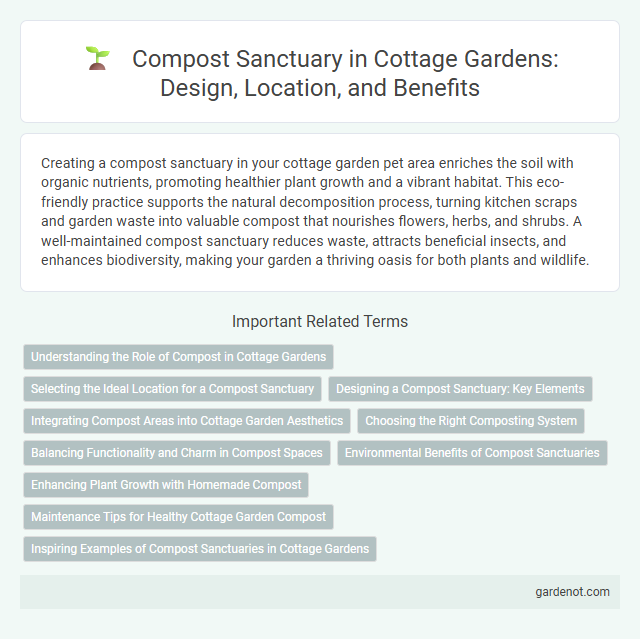Creating a compost sanctuary in your cottage garden pet area enriches the soil with organic nutrients, promoting healthier plant growth and a vibrant habitat. This eco-friendly practice supports the natural decomposition process, turning kitchen scraps and garden waste into valuable compost that nourishes flowers, herbs, and shrubs. A well-maintained compost sanctuary reduces waste, attracts beneficial insects, and enhances biodiversity, making your garden a thriving oasis for both plants and wildlife.
Understanding the Role of Compost in Cottage Gardens
Compost acts as a vital nutrient reservoir in cottage gardens, enriching the soil with organic matter that boosts plant growth and resilience. It fosters beneficial microbial activity, enhancing soil structure and water retention crucial for diverse garden plants. This natural fertilizer reduces the need for chemical inputs, promoting sustainable and eco-friendly gardening practices.
Selecting the Ideal Location for a Compost Sanctuary
Choosing the ideal location for a compost sanctuary in a cottage garden involves selecting a well-drained, shaded area that is easily accessible for regular maintenance and organic waste addition. Positioning the compost site near water sources and away from living spaces helps maintain moisture balance and reduces odors, promoting healthy decomposition. Ensuring good airflow around the compost heap accelerates microbial activity, resulting in nutrient-rich humus ideal for enriching garden soil.
Designing a Compost Sanctuary: Key Elements
Designing a compost sanctuary in a cottage garden involves selecting a well-drained, shaded location to maintain optimal moisture and temperature for decomposition. Incorporate layers of nitrogen-rich green materials and carbon-rich brown materials to balance the compost and accelerate nutrient cycling. Use a compost bin or enclosure to contain materials, prevent pests, and promote aeration through regular turning, ensuring rich, fertile soil for garden beds.
Integrating Compost Areas into Cottage Garden Aesthetics
Integrating compost areas into a cottage garden enhances soil fertility while maintaining visual harmony with lush flower beds and rustic pathways. Utilizing decorative bins or natural barriers like woven willow fences blends compost spots seamlessly into the garden's charming, informal design. Strategic placement near herb clusters or vegetable patches ensures easy access for gardeners and supports sustainable, nutrient-rich growth.
Choosing the Right Composting System
Selecting the right composting system for a cottage garden involves evaluating factors such as space availability, composting speed, and the types of organic waste produced. Tumblers, bins, and worm farms each offer unique benefits; tumblers speed up decomposition, bins are versatile for most waste types, and worm farms excel at processing kitchen scraps efficiently. Matching the composting method to garden size and waste characteristics optimizes nutrient-rich compost production, enhancing soil fertility and plant health.
Balancing Functionality and Charm in Compost Spaces
A compost sanctuary within a cottage garden merges practicality with aesthetic appeal, creating a vibrant ecosystem that enriches soil fertility naturally. Strategically placed compost bins or piles blend seamlessly with flowering plants and rustic decor, enhancing garden beauty while supporting sustainable gardening. Thoughtful layering of organic materials accelerates decomposition, ensuring nutrient-rich humus that boosts plant health and sustains the garden's lush charm.
Environmental Benefits of Compost Sanctuaries
Compost sanctuaries enhance soil fertility by recycling organic waste into nutrient-rich humus, supporting robust plant growth in cottage gardens. They significantly reduce landfill waste and lower greenhouse gas emissions by diverting biodegradable materials from incineration or dumping. These natural recycling systems improve soil structure and water retention, fostering sustainable, eco-friendly gardening practices.
Enhancing Plant Growth with Homemade Compost
A compost sanctuary transforms organic waste into nutrient-rich compost that significantly enhances plant growth in a cottage garden by improving soil structure, moisture retention, and nutrient availability. Homemade compost boosts beneficial microbial activity, promoting healthier root systems and increased resistance to pests and diseases. Consistent use of compost supports sustainable gardening practices, leading to vibrant, thriving plants in a natural ecosystem.
Maintenance Tips for Healthy Cottage Garden Compost
Regularly turning the compost pile ensures proper aeration and accelerates the decomposition process, promoting nutrient-rich soil for a thriving cottage garden. Maintaining a balanced mix of green materials like vegetable scraps and brown materials such as dry leaves prevents odor and encourages microbial activity. Monitoring moisture levels and adding water during dry spells keeps the compost moist but not soggy, essential for sustaining beneficial organisms that support plant health.
Inspiring Examples of Compost Sanctuaries in Cottage Gardens
Compost sanctuaries in cottage gardens transform organic waste into nutrient-rich soil, fostering vigorous plant growth and sustainable gardening practices. Examples like the lush, layered compost mounds at Sissinghurst Castle Garden and the integrated worm compost bins at Hidcote Manor demonstrate how these sanctuaries enhance biodiversity and soil health. Gardeners benefit from replicating such eco-friendly compost systems to cultivate thriving, resilient cottage gardens.
Compost sanctuary Infographic

 gardenot.com
gardenot.com